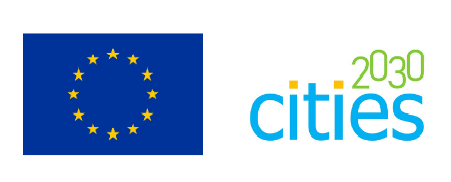|
|
Co-creating resilient and sustainable food systems towards FOOD2030 (CITIES2030)
Today, more than 70% of people live in and around cities, and the demand for food is growing, especially organic and local (Latvian-produced) food. Existing urban and regional food systems are unsustainable, and society expects and demands a change. To help prevent and reduce food waste, reduce the environmental impact of food production and food waste, and promote access to healthy food for all, it is essential to make and develop smart human-centered food systems that cover all stages of the food chain: primary production, processing, logistics (transport, supply, storage), trade, consumption, and re-use.
The CITIES2030 project, funded by the European Union' s Horizon 2020 science and research support program, will seek and test solutions to restructure or reshape the various stages of the food chain to meet the challenges and needs of the 21st century society. CITIES2030' s vision is to develop and connect short food supply chains gathering consumers, strategic and industry partners, civil society, business, leading universities and researchers from different disciplines involved in building the food security ecosystem for cities and regions.
Within CITIES2030, policy and living labs will be established and tested in 2 regions (including Vidzeme) and 9 EU cities, which will be further adapted and implemented in a total of 50 EU cities or regions. As a result of the pilot activities carried out during the project, the participating cities and regions will create the preconditions for improving the food security ecosystem, enabling businesses to invest more efficiently, the public sector to use resources more efficiently to supply food which is received in the most environmentally and socially friendly way possible.
Three partners from Latvia are involved in the project: Vidzeme Planning Region as a pilot site for testing solutions, the Latvian Rural Forum as a representative of civil society interests and Riga Technical University – a provider of scientific substantiation.
|
Title
|
Co-creating resilient and sustainable food systems towards FOOD2030 |
| Abbreviation |
CITIES2030 |
| Lead partner |
UNIVERSITA CA' FOSCARI VENEZIA (Italy) |
| Project number |
101000640 |
| Programme |
Horizon 2020 |
| Partners |
- UNIVERSITA CA' FOSCARI VENEZIA (Italy)
- EPC - EUROPEAN PROJECT CONSULTING -SRL (Italy)
- STAD BRUGGE (Belgium)
- KATHOLIEKE HOGESCHOOL VIVES ZUID (Belgium)
- ISTANBUL AVRUPA ARASTIRMALARI DERNEGI (Turkey)
- INAGRO, PROVINCIAAL EXTERN VERZELFSTANDIGD AGENTSCHAP IN PRIVAATRECHTELIJKE VORM VZW (Belgium)
- EREVNITIKO IDRIMA P.L. (Cyprus)
- RAZVOJNA AGENCIJE GRADA VELIKA GORICA - VE-GO-AR (Croatia)
- INVENTIVNA RJESENJA DOO (Croatia)
- VEJLE KOMMUNE (Denmark)
- QUANTITAS SRL (Italy)
- INTO SEINAJOKI OY (Finland)
- PROAGRIA ETELA-POHJANMAA RY (Finland)
- SMART & LEAN HUB OY (Finland)
- STADT BREMERHAVEN (Germany)
- VEREIN ZUR FORDERUNG DES TECHNOLOGIETRANSFERS AN DER HOCHSCHULE BREMERHAVEN EV (Germany)
- BIOZOON GMBH (Germany)
- AYUNTAMIENTO DE QUART DE POBLET (Spain)
- FUNDACION SOCIALINNOLABS (Spain)
- UNIVERSIDAD POLITECNICA DE MADRID (Spain)
- WATERFORD INSTITUTE OF TECHNOLOGY (Ireland)
- MATIS OHF (Iceland)
- FUTURE FOOD INSTITUTE (Italy)
- VIDZEMES PLANOSANAS REGIONS (Latvia)
- LATVIJAS LAUKU FORUMS (Latvia)
- ZDRUZENIE PLATFORMA ZA ZELEN RAZVOJSKOPJE (Republic of North Macedonia)
- AG FUTURA TECHNOLOGII DOOEL SKOPJE (Republic of North Macedonia)
- MUNICIPIUL IASI (Romania)
- ACADEMIA ROMANA FILIALA IASI (Romania)
- ITC - INOVACIJSKO TEHNOLOSKI GROZD MURSKA SOBOTA (Slovenia)
- CORRELATE AS (Norway)
- COMUNE DI VICENZA (Italy)
- STICHTING VU (Netherlands)
- MESTNA OBCINA MURSKA SOBOTA (Slovenia),
- UNIVERSITE DU LUXEMBOURG (Luxembourg)
- ENOSI KINOTITON KIPROU (Cyprus)
- PRIMELAYER LDA (Portugal)
- UNIVERSITA IUAV DI VENEZIA (Italy)
- RIGAS TEHNISKA UNIVERSITATE (Latvia)
- CITE DE L AGRICULTURE (France)
- GEMEENTE HAARLEM (Netherlands)
|
| Objectives |
- Identify and map short food supply chains in the region, by identifying small and medium-sized producers, processors, consumers, actors of the food logistics stage, involved NGOs and public organizations.
- Involve the local community to identify its needs and opportunities towards a sustainable food system.
- Identify the best practices (CITIES2030 partners) for regional food ecosystems and short food supply chains, identify challenges at regional, national, and international levels, select and adapt best approaches for testing in the region.
- Develop and test new methods and tools to establish and strengthen sustainable regional food ecosystem of short supply chains in close cooperation with local communities.
- Prepare and make recommendations to state institutions and local governments to better align their strategies, plans, and actions with the guidelines of the EU strategy “FOOD 2030”.
|
| Activities |
- Establish living and policy labs to achieve and promote the involvement of local producers, processors and other stakeholders in the development of the regional food ecosystem.
- Increase the awareness, involvement, and knowledge of local people about the importance of a sustainable food ecosystem and the role of individuals and communities in it.
- Support the development of short food chains by promoting the consumption of local products, cooperation of catering service providers, retailers with local producers, processors, promoting the increase of the share of regionally produced products in the assortment.
- Improve policies, strategies, action plans, and regulations to support the development of sustainable and lasting food ecosystems at regional and national levels.
|
| Results |
- A sustainable public procurement mechanism tailored to the needs of sustainable and lasting regional food chains has been established.
- Smart villages and cities (local initiatives) have been set up to promote the development of short food supply chains, various forms of cooperation, and positive changes in the consumption behavior of citizens/consumers.
- There is a public-private partnership that creates systematic change in existing and apparent food chains in the regions.
- Developed and tested innovative/new business models, production, storage and delivery solutions.
|
| Budget |
Total - 12 513 955,75 EUR
VPR budget - 184 300 EUR,
EU funding programme - 184 300 EUR |
| Implementation period |
1.10.2020.-30.09.2024.
|
| Contact person |
Lelde Ābele
+371 29266757
lelde.abele@vidzeme.lv
|
| Project' s web page |
http://www.cities2030.eu/ |
|
|





